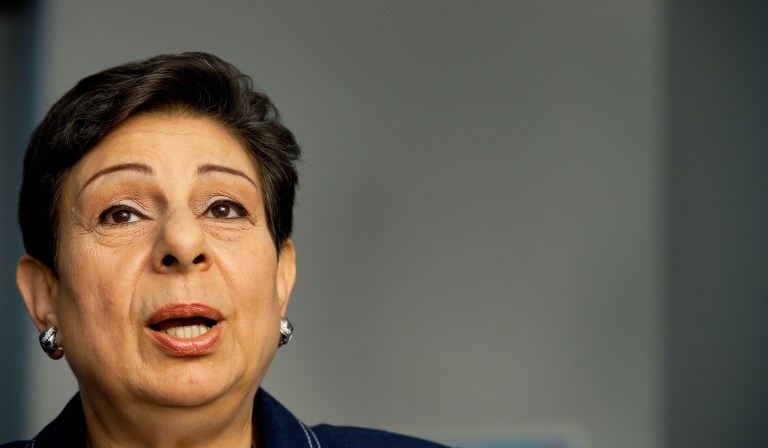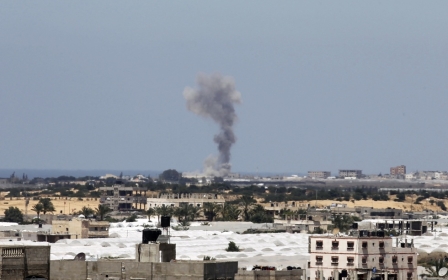PLO looks beyond halted peace talks

April was a busy month for the Palestine Liberation Organization. After the Israeli government reneged on the last of four rounds of prisoner releases scheduled for 29 March – a release promised initially in the Sharm El-Sheikh memorandum in 1999 and again in July 2013 at the beginning of the latest negotiations – US Secretary of State John Kerry’s last-ditch effort to stabilize the situation collapsed amid a renewed expansion of Israeli settlements in East Jerusalem and the Palestinian Authority’s accession to 15 UN conventions and treaties. A few weeks later, while talks continued to stall and Israel threatened economic sanctions against the PA, officials of Fatah and Hamas announced a unity agreement to bring together the governments of the West Bank and Gaza, separated since a bloody political struggle in 2007.
To many outsiders, these decisions by the Palestinian leadership – negotiations with Israel and the US, moves forward at the UN, a unity agreement with Hamas – seemed strategically incoherent if not downright contradictory, especially because of Hamas’ continued refusal to recognize Israel. “It’s hard to see how Israel can be expected to negotiate with a government that does not believe in its right to exist,” said US State Department Spokeswoman Jen Psaki at the time.
But Palestinian analysts and government officials are quick to disagree. Naseef Muallam, director of the Palestinian Center for Peace and Democracy, a longstanding Palestinian NGO advocating for a two-state solution and a secular, democratic Palestinian state, says that moves with the UN and Hamas are just part of the Palestinian negotiation strategy. “When we are talking about negotiations,” Muallam said, “it means negotiations with Americans, negotiations with the Israelis, negotiations with the Jordanians, negotiations with the Egyptians, negotiations with the Europeans, negotiations with the United Nations – we need different negotiations.”
Muallam said that by looking outside of Israel and the United States for negotiating partners, the PLO can introduce external pressure on the two for future rounds of talks. “If the Palestinians would negotiate with Moscow, Berlin, Brussels, maybe the Americans would be more flexible,” said Muallam. “The Americans have it in their power to pressure the Israelis if their interests are threatened in the Middle East, and the American interests will be threatened...if the other international players will be part of this.”
Building the American relationship with Palestine
Stay informed with MEE's newsletters
Sign up to get the latest alerts, insights and analysis, starting with Turkey Unpacked
For the Americans’ part, a recent interview on the Israeli news website Ynet with sources involved in the talks showed no lack of frustration with Israeli tactics during the negotiations. “People in Israel shouldn’t ignore the bitter truth – the primary sabotage came from the settlements,” said one of the unnamed interviewees.
Dr Husam Zomlot suggests that positive feelings toward the Palestinian government among US officials could be leveraged to develop a stronger relationship with the Americans. Zomlot, former PLO representative to the UK and, in his words, deputy to senior PLO negotiator Nabil Shaath, said that the agenda of the Palestinians should focus more on bilateral talks with the US. “In America there is a window to build a bilateral relationship with us that is separate from the trilateral relationship that includes Israel in the context of a failed peace process,” says Zomlot.
Zomlot says that focusing on a bilateral relationship with the US casts recent developments at the UN and with Hamas as aids to diplomacy rather than hindrances. “If you remove the trilateral relationship [between the PLO, US, and Israel] from the reconciliation track, I think America and its policies would be much more inclined and much more in line with our own policy,” Zomlot said. “And the same thing applies for the UN.”
Muallam adds that reconciliation between Hamas and Fatah also strengthens the US position as they attempt to bring Israel to the negotiating table. “If Hamas is part of this government that recognizes Israel or recognizes the international resolutions, it helps the Americans when they sit with the Israelis,” says Muallam. “The Israelis will not have their justifications of ‘Hamas is talking about from the river to the sea,’” he continues, referencing calls by the political party for a Palestinian state to be established on all the land between the Jordan river and the Mediterranean.
Since the announcement of the unity agreement, the prospect of reconciliation has exposed a rift between American and Israeli political goals. While the US legislature quickly moved to threaten a cessation of crucial financial aid to the PA, they have implied unlike Israel that they would support a unity government if it abided by conditions that the PLO has already agreed to, including committing to non-violence, recognizing Israel, and accepting previous diplomatic agreements. The Americans have remained ambiguous about whether their support would hinge on Hamas agreeing to the conditions separately from the unity government.
Essential, not political
No matter the ramifications on the peace process, Zomlot says that reconciliation with Hamas and the PA’s accession to the UN conventions were based on Palestinian needs rather than political tactics. According to him, the moves were necessary means of developing the democratic character of the Palestinian government. “There is no contradiction between building a democratic system and the negotiations,” Zomlot said. “Why should we see it as an either/or?”
Dr Hanan Ashrawi, a Palestinian legislator and member of the PLO Executive Committee, agreed with Zomlot that the unity agreement and signing of UN conventions were separate from negotiations with Israel whether failed or successful. Reconciliation “is part of a long-term strategy and part of work that has been ongoing for years,” Ashrawi said. “It has nothing to do with negotiations.”
In fact, she said, the timing of the reconciliation announcement with the collapse of the talks was coincidental rather than politically motivated. “The timing had to do with many things, not just the negotiations,” Ashrawi said. “At least in the PLO executive, that wasn’t the issue,” she added.
In this regard, according to Ashrawi, the unity agreement and the accession to UN conventions differed. On the latter, she said, the timing was deliberate. “It was because Israel not only built more settlement activity...but also because they reneged on the agreement of the prisoners.”
But she hastened to reiterate that the UN moves would have happened regardless of the outcome of the negotiations. “If the talks succeed or if they fail – if we have sovereignty or if we’re still under occupation – we will accede to conventions and we will join organization and agencies because it is our right,” Ashrawi said.
“Negotiations are not a value unto themselves”
Both Ashrawi and Zomlot insist that negotiations with Israel remain a tool – one of many political mechanisms that the PLO has at its disposal. “The negotiations are...a means to an end, and they have been seriously flawed,” Ashrawi said. “If the tool is flawed, you have to either fix it or throw it out and find alternatives.”
“Strategy is about your means to attain your goal,” Zomlot agreed. “We have used negotiations almost solely over the past 20 years and it has been taking us away from the internationally agreed final destination.” Now, he said, “we’re making sure the negotiations will not swallow everything else.”
While the leadership of the PLO mends the rift with Hamas and looks to the US and UN, reports have surfaced that Israel may be more inclined in the future to deal with Mohammed Dahlan, Mahmoud Abbas’ fierce rival within Fatah who enjoys considerable popularity in the Gaza Strip and some of the West Bank’s refugee camps. Between the collapse of the peace talks and the reconciliation announcement, Dahlan expressed his intention to run for President of the PA if elections were held.
Although no date has been set for such elections, the unity agreement and formation of a new PA government raises again the question of Abbas’ succession in the presidency. Muallam said that Abbas, 79, wanted the reconciliation as part of his political legacy, but may be thinking about the end of his career. “President [Abbas] doesn’t want to leave politics without having this Palestinian unification...he wants to go home by solving this,” Muallam said.
Whatever the political agenda of the reconciliation agreement and the movement forward at the UN, Ashrawi insists that the primary purpose of each was its intrinsic benefit. “They’re not alternatives [to negotiations], they’re our right,” she said. “Going to the UN, joining the international community in itself is a value. Negotiations are not a value unto themselves, they’re a means.”
Middle East Eye delivers independent and unrivalled coverage and analysis of the Middle East, North Africa and beyond. To learn more about republishing this content and the associated fees, please fill out this form. More about MEE can be found here.




